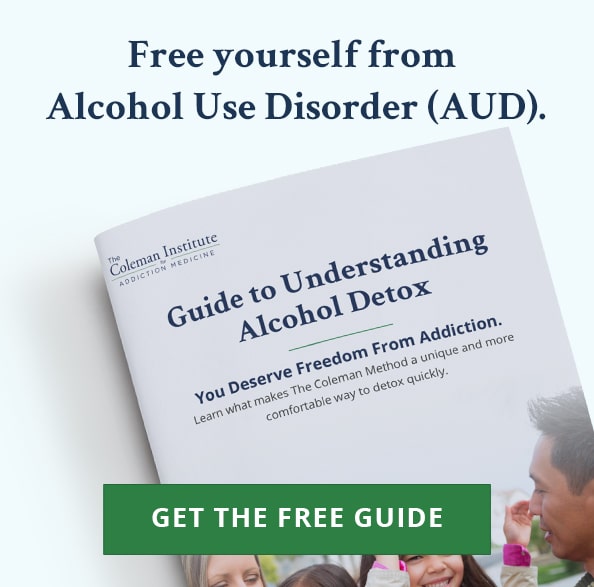
Alcohol Detox FAQs
-
- What is the Outpatient Alcohol Detoxification Program?
- What is Alcohol Dependence?
- When should a person detox from alcohol?
- How soon after stopping drinking can the first symptoms of withdrawal be expected?
- What are alcohol withdrawal symptoms?
- How does alcohol addiction affect blood pressure and heart rate?
- How does prolonged alcohol use impact brain functions?
- Does the Alcohol Detoxification Program have any risks or side effects?
- Is it safe to undergo the detox process without professional help?
- How do we reduce the risk of relapse?
1. What is the Outpatient Alcohol Detoxification Program?
The Coleman Institute’s three-day outpatient program is a safe, effective alternative to inpatient detoxification or potentially dangerous self-detox. After screening a patient to ensure they’re a good fit for our approach, we begin by replenishing all of the vitamins and minerals that alcohol has depleted from their body. We stabilize their condition and give them medicine to calm them and reduce withdrawal symptoms. We’ll monitor the patient closely and determine the optimal medicine dosing that will keep them comfortable and safe as they detox.
At the end of the first day, we discharge the patient into the care of a trusted family member or friend, following detailed instructions that we provide. They return to our office for monitoring over the next two days until they complete their detox and are ready to begin recovery.
2. What is Alcohol Dependence?
Alcohol Dependence, or alcoholism, is a distinct disease. Our bodies have a system that helps us deal with stress and calm down, but regularly drinking alcohol can suppress this system. As a result, when a person depends on alcohol, their body cannot calm itself, so they need to drink to feel “normal.” They experience withdrawal symptoms as they digest the alcohol, because their body is not able to calm itself down. The only way to reduce withdrawal symptoms and feel better is to drink more.
3. When should a person have a medical detox from alcohol?
If you find yourself experiencing alcohol withdrawal symptoms when you stop drinking, such as tremors, nausea, or anxiety, it is a sign that your body has become dependent on alcohol and detox might be necessary. Additionally, if your alcohol consumption negatively impacts your daily life, relationships, or responsibilities, it could be time to explore medical detox and recovery options. Detoxing from alcohol can be dangerous without proper supervision due to potential severe withdrawal symptoms. If you are unsure, it’s best to consult a healthcare provider for personalized guidance.
4. How soon after stopping drinking can the first symptoms of withdrawal be expected?
Mild symptoms of withdrawal can appear as early as 6 to 12 hours after the last drink. These symptoms might include anxiety, nausea, sweating, and a slightly increased heart rate. While these might be termed as ‘mild’, it’s essential to note that alcohol withdrawal can progress to more severe stages, and it’s crucial to seek medical care if considering stopping heavy drinking.
5. What are alcohol withdrawal symptoms?
Alcohol withdrawal symptoms are uncomfortable and can be deadly. Characteristic reactions include:
- tremors
- agitation
- sweating
- nervousness
- insomnia
- elevated pulse
- elevated blood pressure
In addition, the nervous system becomes so agitated that sometimes it short-circuits and triggers a seizure. In the worst stages of alcohol withdrawal, the brain can become very confused or delirious. When this confusion occurs along with agitation or tremors, people develop Delirium Tremens (DTs) — which can be life-threatening.
6. How does alcohol addiction affect blood pressure and heart rate?
Alcohol addiction can have profound effects on the cardiovascular system. Heavy drinking can lead to elevated blood pressure, putting stress on the heart and increasing the risk of heart disease. Moreover, excessive alcohol use can lead to irregular heart rhythms. When an individual decides to stop drinking, the sudden absence of alcohol can lead to fluctuations in both blood pressure and heart rate, making medical care vital during the alcohol detox process.
7. How does prolonged alcohol use impact brain functions?
Chronic alcohol use disorders have detrimental effects on brain functions. The central nervous system, which controls most body functions, can be severely disrupted by heavy drinking. Over time, alcoholism can impair cognitive functions, affect decision-making, and alter mood and behavior. When an individual ceases to drink alcohol abruptly, the brain struggles to readjust, leading to symptoms of alcohol withdrawal.
8. Does the Alcohol Detoxification Program have any risks or side effects?
Throughout the process, we closely monitor patients to reduce withdrawal reactions. We also give appropriate medication doses to reduce problems. Our outpatient Alcohol Detoxification is very safe, but as with any medical procedure, some risks and potential complications exist. These include:
- Discomfort: Some patients experience minor discomfort during the detox. If this occurs, we provide additional medication for comfort.
- Seizures: Patients very rarely experience seizures while detoxing.
9. Is it safe to undergo the detox process without professional help?
While some individuals with milder forms of alcohol addiction might experience only mild symptoms when they stop drinking, others, especially those with a history of heavy drinking or underlying health conditions, can experience severe and potentially life-threatening withdrawal symptoms. When a person is ready to get into recovery and start an alcohol detox, seeking professional medical care is always recommended.
10. How do we reduce the risk of relapse?
We recommend that all patients use Naltrexone therapy for at least six months following their Alcohol Detox. Long-acting Naltrexone therapy is available after detox. To learn more about how this revolutionary approach helps encourage lasting recovery, check out our Naltrexone Therapy page and Naltrexone Therapy for Alcohol FAQs.
Let’s Take the Next Step Together.
Have questions or want to learn more? Contact us today at 888-705-9615.


